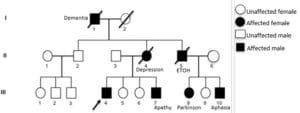Rozwijanie nadziei: czym jest rodzinne FTD?

When a relative is diagnosed with FTD, the AFTD HelpLine is often asked, “Could I also develop FTD?” What they are really asking is – is my loved one’s FTD genetic? Are that person’s siblings and children at risk of familial FTD? The AFTD HelpLine can assist you with the decision to consult with a genetic counselor for answers.
A genetic counselor can help you:
- Understand your family history and whether FTD may be familial or sporadic.
- Decide about when and if you want to have genetic testing.
- Facilitate testing when appropriate.
- Understand what your results mean for you and your family.
- Plan for the next steps.
The genetic counselor’s role is to support the person and provide education about FTD and genetic risk. Genetic testing may be recommended if FTD appears to be familial, but the choice to participate is always up to you. If you do choose to pursue genetic testing, it is always best to begin testing with the person diagnosed whenever possible.
Understanding your family’s medical history is beneficial to determining if FTD could be inherited. FTD is considered familial when more than one family member has FTD or a related neurologic condition like ALS. FTD is considered sporadic if there is no family history and the cause for FTD is unclear. The majority of individuals (60%) diagnosed with FTD are considered to have sporadic cases.
Very often, family histories are not clear and need to be carefully considered.
Because FTD causes many types of behavior, communication, and/or movement difficulties, members of the same family who have FTD may experience very different symptoms. FTD is also commonly misdiagnosed or not diagnosed at all. As a result, when talking with a genetic counselor. families should include information about relatives diagnosed with other conditions whether or not their symptoms seem to be similar to FTD
Any relative diagnosed with dementia, Alzheimer’s disease, Parkinson’s disease, ALS, or a psychiatric condition such as depression, bipolar disorder, or schizophrenia may point to FTD being familial. Exploring details about when symptoms began or at what age the person was diagnosed can provide useful insight.
As an example, schizophrenia typically develops in young adulthood. Thus, it would be unexpected for a relative to be diagnosed with schizophrenia in their 40s or 50s. Similarly, Alzheimer’s disease diagnosed at a younger age or without significant memory issues could be a clue that the relative may have FTD. Asking your family members more detailed questions can be helpful.
Below is an example of how a genetic counselor will diagram a family medical history in a form called a “pedigree.” A pedigree is an easy way to review the entire family’s medical history at a glance and offers insight about patterns of inheritance in the family. Your genetic counselor will draw your family’s pedigree and assess whether FTD in your family appears familial.

Family pedigree charts like the one shown here are used by genetic counselors to explore the likelihood of a family member’s FTD being familial.
You may need to consider the absence of information in your family history. If a relative passed at a younger age, you do not know if they would have developed symptoms of FTD later in life. It is important to keep in mind, particularly for older relatives or when reviewing family history from past generations, that the same diagnostic tools were not available and knowledge of FTD and other dementias was more limited.
Issues surrounding the stigma associated with dementia are also prevalent. In some cases, shame regarding a dementia diagnosis may result in an unwillingness to acknowledge or explore an accurate cause for a person’s changed behavior, making it difficult to know whether FTD runs in your family.
In a small percentage of individuals with no family history of FTD, a genetic cause is identified. Therefore, even those individuals with no family history of FTD could consider meeting with a genetic counselor to review the available options and decide if genetic testing is something worth exploring.
If genetic testing reveals a genetic cause for the person’s FTD, each child of a diagnosed person has a 50% chance of inheriting the gene change that causes FTD in the family. Siblings may also have a chance of having the same familial FTD-causing genetic variant.
To learn more about genetics in FTD or genetic counseling, Kliknij tutaj.
Według kategorii
Nasze biuletyny
Bądź na bieżąco
Zarejestruj się już teraz i bądź na bieżąco dzięki naszemu biuletynowi, powiadomieniom o wydarzeniach i nie tylko…
